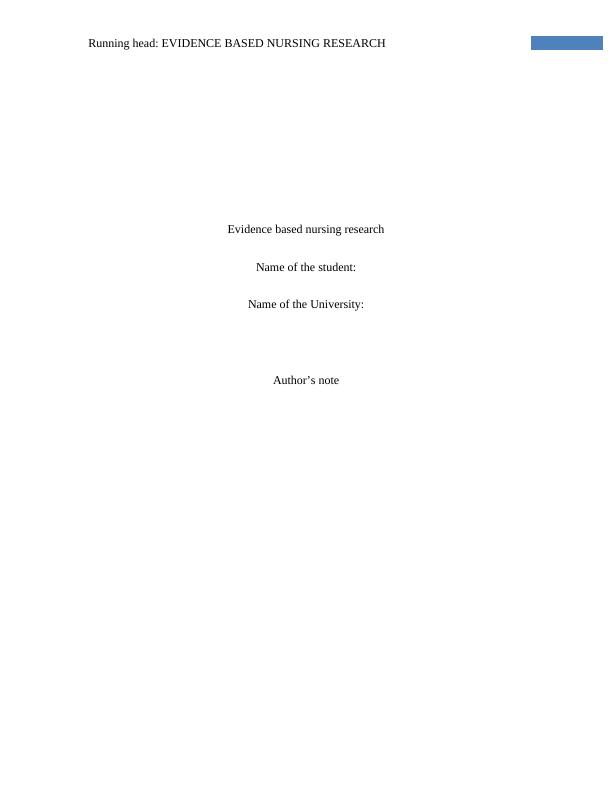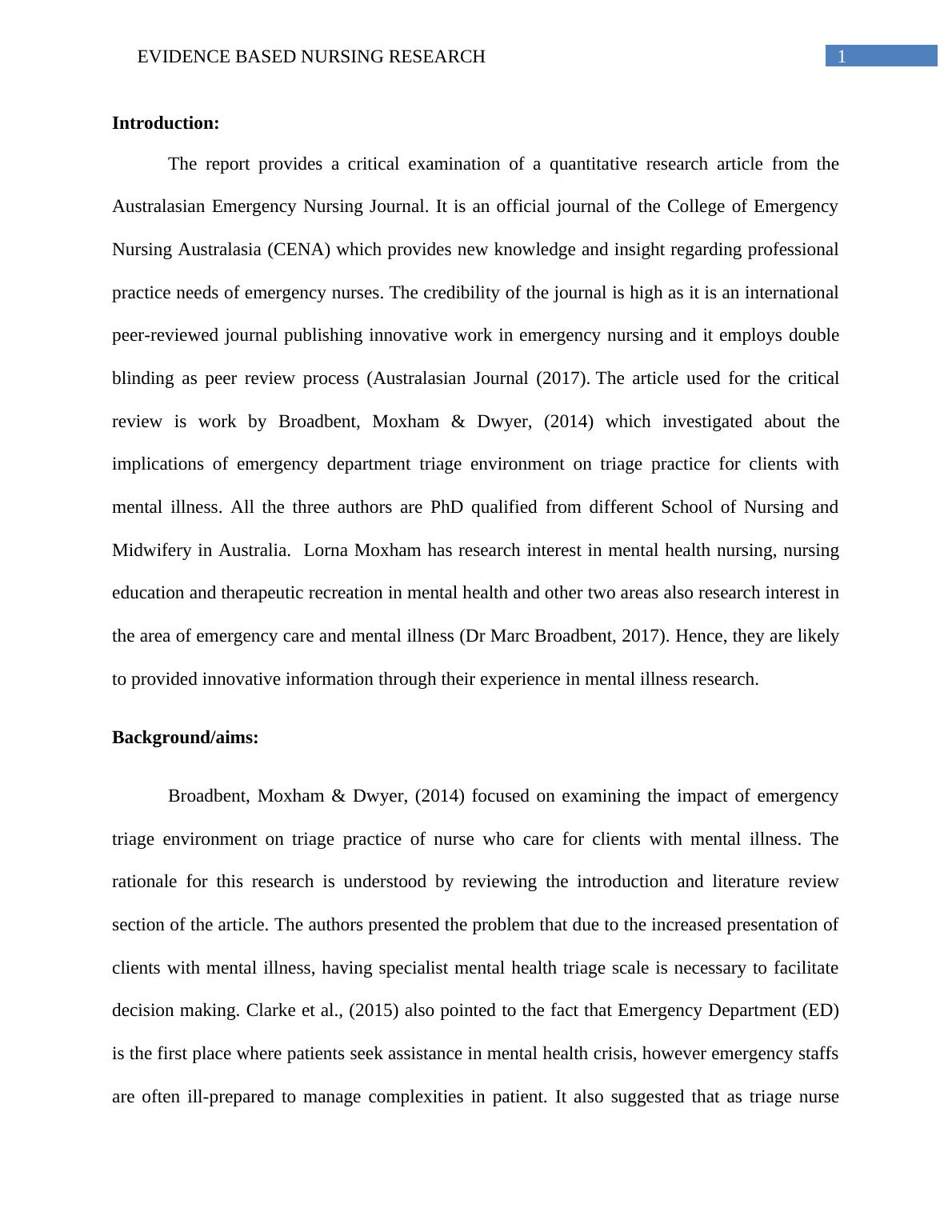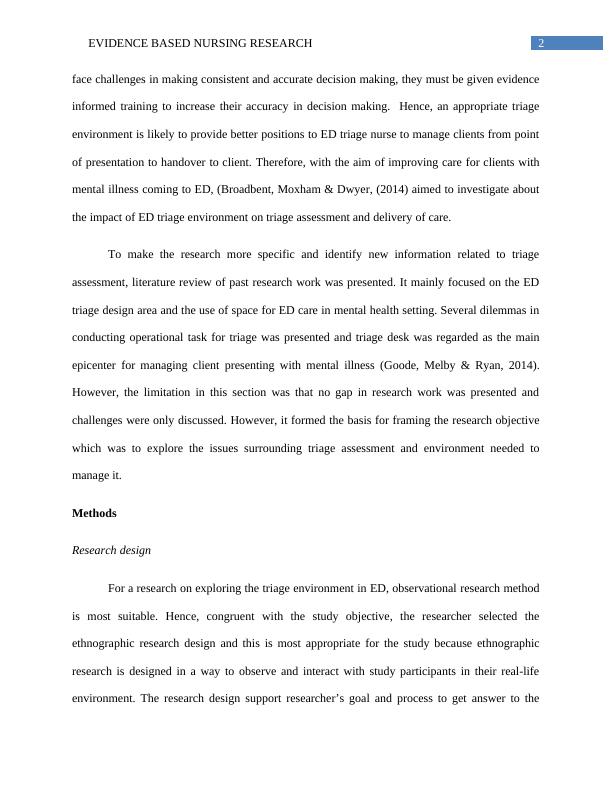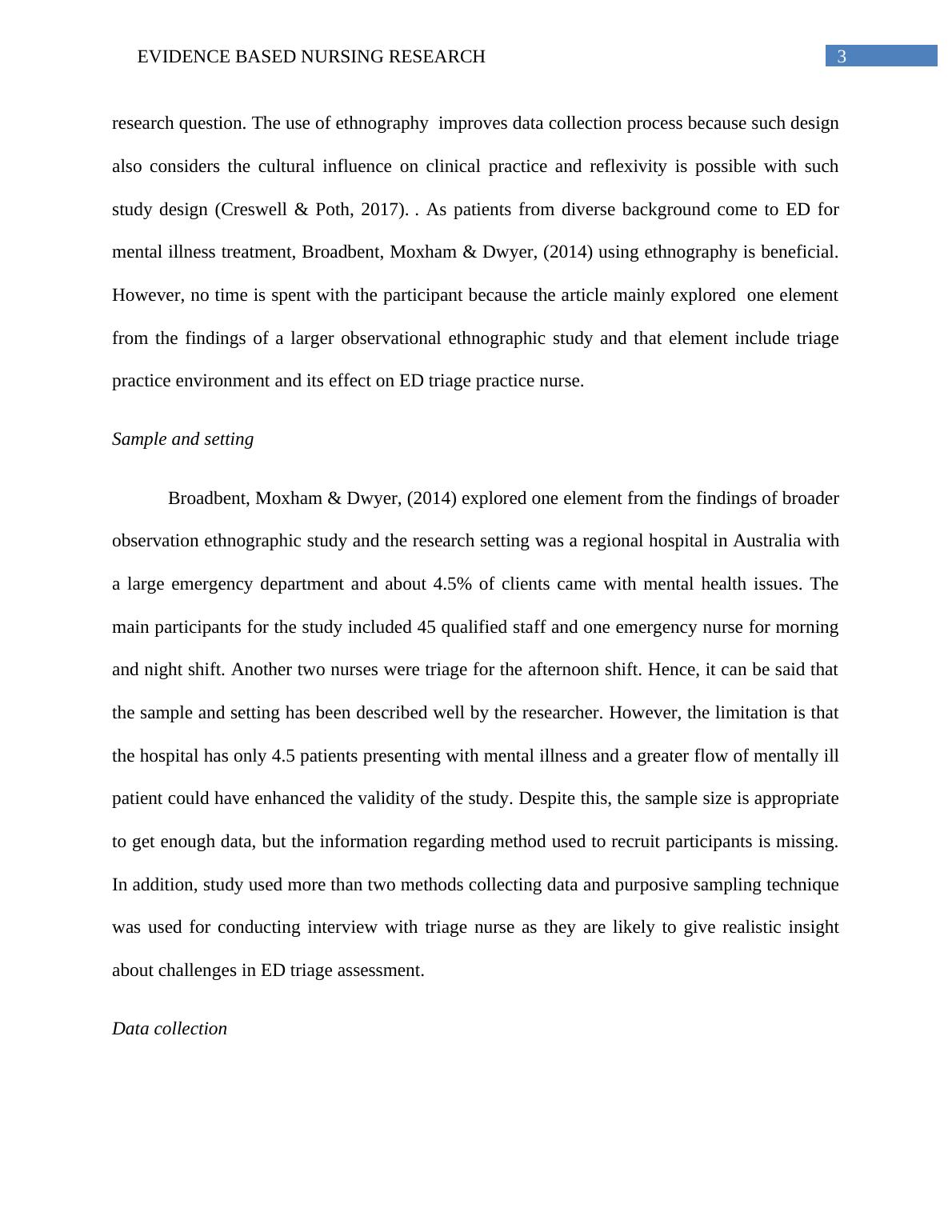Evidence Based Nursing - PDF
11 Pages3009 Words222 Views
Added on 2020-05-11
Evidence Based Nursing - PDF
Added on 2020-05-11
ShareRelated Documents
Running head: EVIDENCE BASED NURSING RESEARCHEvidence based nursing researchName of the student:Name of the University:Author’s note

1EVIDENCE BASED NURSING RESEARCHIntroduction:The report provides a critical examination of a quantitative research article from theAustralasian Emergency Nursing Journal. It is an official journal of the College of EmergencyNursing Australasia (CENA) which provides new knowledge and insight regarding professionalpractice needs of emergency nurses. The credibility of the journal is high as it is an internationalpeer-reviewed journal publishing innovative work in emergency nursing and it employs doubleblinding as peer review process (Australasian Journal (2017).The article used for the criticalreview is work by Broadbent, Moxham & Dwyer, (2014) which investigated about theimplications of emergency department triage environment on triage practice for clients withmental illness. All the three authors are PhD qualified from different School of Nursing andMidwifery in Australia. Lorna Moxham has research interest in mental health nursing, nursingeducation and therapeutic recreation in mental health and other two areas also research interest inthe area of emergency care and mental illness (Dr Marc Broadbent, 2017).Hence, they are likelyto provided innovative information through their experience in mental illness research.Background/aims: Broadbent, Moxham & Dwyer, (2014) focused on examining the impact of emergencytriage environment on triage practice of nurse who care for clients with mental illness. Therationale for this research is understood by reviewing the introduction and literature reviewsection of the article. The authors presented the problem that due to the increased presentation ofclients with mental illness, having specialist mental health triage scale is necessary to facilitatedecision making. Clarke et al., (2015) also pointed to the fact that Emergency Department (ED)is the first place where patients seek assistance in mental health crisis, however emergency staffsare often ill-prepared to manage complexities in patient. It also suggested that as triage nurse

2EVIDENCE BASED NURSING RESEARCHface challenges in making consistent and accurate decision making, they must be given evidenceinformed training to increase their accuracy in decision making. Hence, an appropriate triageenvironment is likely to provide better positions to ED triage nurse to manage clients from pointof presentation to handover to client. Therefore, with the aim of improving care for clients withmental illness coming to ED, (Broadbent, Moxham & Dwyer, (2014) aimed to investigate aboutthe impact of ED triage environment on triage assessment and delivery of care. To make the research more specific and identify new information related to triageassessment, literature review of past research work was presented. It mainly focused on the EDtriage design area and the use of space for ED care in mental health setting. Several dilemmas inconducting operational task for triage was presented and triage desk was regarded as the mainepicenter for managing client presenting with mental illness (Goode, Melby & Ryan, 2014).However, the limitation in this section was that no gap in research work was presented andchallenges were only discussed. However, it formed the basis for framing the research objectivewhich was to explore the issues surrounding triage assessment and environment needed tomanage it.Methods Research designFor a research on exploring the triage environment in ED, observational research methodis most suitable. Hence, congruent with the study objective, the researcher selected theethnographic research design and this is most appropriate for the study because ethnographicresearch is designed in a way to observe and interact with study participants in their real-lifeenvironment. The research design support researcher’s goal and process to get answer to the

3EVIDENCE BASED NURSING RESEARCHresearch question. The use of ethnography improves data collection process because such designalso considers the cultural influence on clinical practice and reflexivity is possible with suchstudy design (Creswell & Poth, 2017).. As patients from diverse background come to ED formental illness treatment, Broadbent, Moxham & Dwyer, (2014) using ethnography is beneficial.However, no time is spent with the participant because the article mainly explored one elementfrom the findings of a larger observational ethnographic study and that element include triagepractice environment and its effect on ED triage practice nurse. Sample and settingBroadbent, Moxham & Dwyer, (2014) explored one element from the findings of broaderobservation ethnographic study and the research setting was a regional hospital in Australia witha large emergency department and about 4.5% of clients came with mental health issues. Themain participants for the study included 45 qualified staff and one emergency nurse for morningand night shift. Another two nurses were triage for the afternoon shift. Hence, it can be said thatthe sample and setting has been described well by the researcher. However, the limitation is thatthe hospital has only 4.5 patients presenting with mental illness and a greater flow of mentally illpatient could have enhanced the validity of the study. Despite this, the sample size is appropriateto get enough data, but the information regarding method used to recruit participants is missing.In addition, study used more than two methods collecting data and purposive sampling techniquewas used for conducting interview with triage nurse as they are likely to give realistic insightabout challenges in ED triage assessment.Data collection

End of preview
Want to access all the pages? Upload your documents or become a member.
Related Documents
Evidence Based Nursing - Assignmentlg...
|12
|2907
|163
Critical evaluation of the qualitative study on impact of emergency department triage environment on the triage practice for mentally-ill clients: in an Australian contextlg...
|13
|3145
|178
Emergency Department Triage Analysis (Doc)lg...
|13
|3329
|339
Evidence-Based Health Research and Practicelg...
|16
|2803
|75
Report on Research Article Relevant to Nursing Practicelg...
|11
|2886
|159
Critical Analysis Assignment (Doc)lg...
|12
|3010
|64
